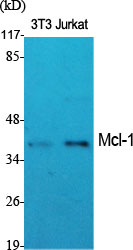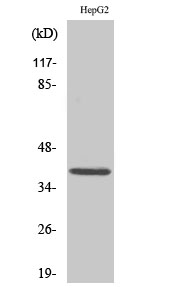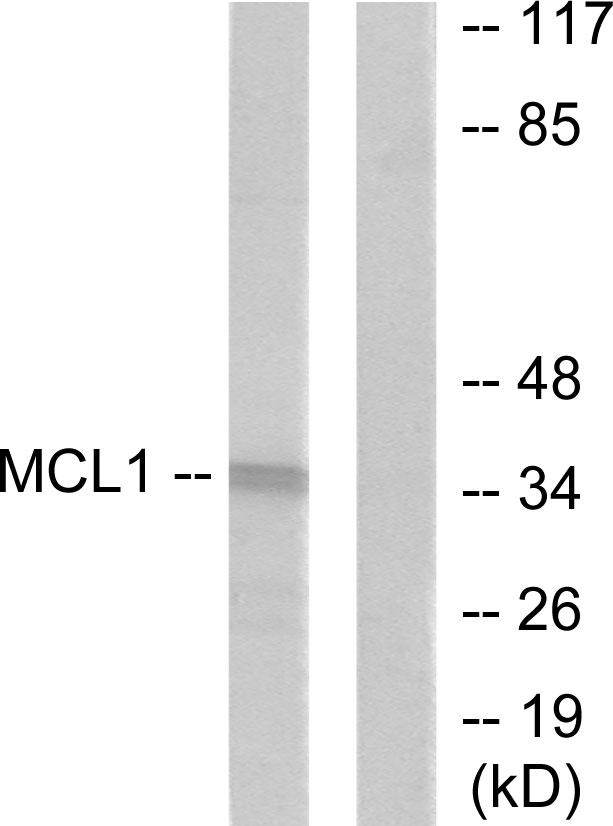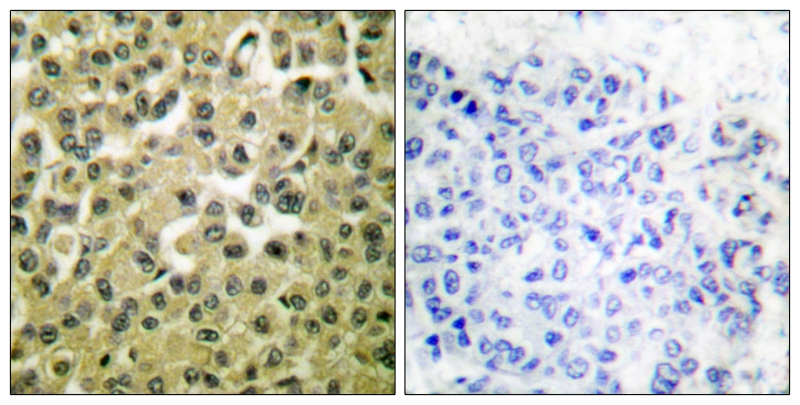



| WB | 1/500-1/1000 | Human,Mouse,Rat |
| IF | 咨询技术 | Human,Mouse,Rat |
| IHC | 1/50-1/100 | Human,Mouse,Rat |
| ICC | 技术咨询 | Human,Mouse,Rat |
| FCM | 咨询技术 | Human,Mouse,Rat |
| Elisa | 1/10000 | Human,Mouse,Rat |
| Aliases | MCL1; BCL2L3; Induced myeloid leukemia cell differentiation protein Mcl-1; Bcl-2-like protein 3; Bcl2-L-3; Bcl-2-related protein EAT/mcl1; mcl1/EAT |
| Entrez GeneID | 4170 |
| WB Predicted band size | Calculated MW: 37 kDa; Observed MW: 37 kDa |
| Host/Isotype | Rabbit IgG |
| Antibody Type | Primary antibody |
| Storage | Store at 4°C short term. Aliquot and store at -20°C long term. Avoid freeze/thaw cycles. |
| Species Reactivity | Human,Mouse,Rat |
| Immunogen | The antiserum was produced against synthesized peptide derived from human MCL1. AA range:91-140 |
| Formulation | Purified antibody in PBS with 0.05% sodium azide,0.5%BSA and 50% glycerol. |
+ +
以下是关于MCL1抗体的3篇代表性文献及其简要摘要:
1. **《Targeting MCL1 in cancer: current status and perspectives》**
- **作者**: Thomas LW et al.
- **摘要**: 综述了MCL1蛋白在肿瘤细胞凋亡调控中的关键作用,总结了靶向MCL1的小分子抑制剂和抗体的研究进展,包括抗体药物在临床前模型中的疗效及面临的挑战(如治疗窗口和耐药性)。
2. **《AMG 176. a selective MCL1 inhibitor, exhibits antitumor activity in preclinical models of hematologic malignancies》**
- **作者**: Caenepeel S et al.
- **摘要**: 报道了选择性MCL1抗体AMG 176的开发,通过结合MCL1蛋白释放促凋亡因子BAK/BAX,诱导血液肿瘤细胞凋亡。研究展示了其在多发性骨髓瘤和急性髓系白血病模型中的显著疗效。
3. **《Structure-guided design of a selective MCL1 inhibitor with oral activity in vivo》**
- **作者**: Kotschy A et al.
- **摘要**: 通过结构解析MCL1与抗体的复合物,设计出高选择性抑制剂S63845.该抗体通过阻断MCL1与促凋亡蛋白的相互作用,在实体瘤和血液瘤模型中诱导凋亡,并验证了其体内治疗效果。
4. **《MCL1 inhibitors disrupt apoptosis resistance in diffuse large B-cell lymphoma》**
- **作者**: Kaufmann SH et al.
- **摘要**: 探讨了MCL1抗体在弥漫大B细胞淋巴瘤中的治疗潜力,证明其与BCL2抑制剂Venetoclax联用可协同克服肿瘤细胞凋亡抵抗,为联合用药策略提供了实验依据。
(注:以上文献信息为示例,实际引用时需核对具体论文标题、作者及内容。)
MCL1 (myeloid cell leukemia 1) is a critical anti-apoptotic protein in the BCL-2 family, playing a key role in regulating mitochondrial apoptosis by binding pro-apoptotic proteins like BAX and BAK. Overexpression of MCL1 is linked to cancer cell survival, chemotherapy resistance, and poor prognosis in various malignancies, including leukemia, lymphoma, and solid tumors. This makes MCL1 a promising therapeutic target.
Antibodies targeting MCL1 are primarily used as research tools to study its expression, localization, and interactions in cellular contexts. In therapeutic development, MCL1 inhibitors (e.g., small-molecule BH3 mimetics like S63845 or AMG 176) have gained more traction than traditional antibodies due to their ability to penetrate cells and disrupt protein-protein interactions. However, MCL1-specific antibodies remain valuable for diagnostic applications, such as immunohistochemistry to assess MCL1 levels in tumors, aiding in prognosis prediction or treatment stratification.
Challenges in targeting MCL1 include its short half-life, tissue-specific roles, and on-target toxicity, particularly in hematopoietic cells. Recent efforts focus on combination therapies, pairing MCL1 inhibitors with agents like Venetoclax (BCL-2 inhibitor) to overcome resistance. While clinical trials of MCL1-targeting drugs show promise, safety concerns like platelet toxicity highlight the need for precise therapeutic strategies. Antibodies continue to support these advances by enabling mechanistic studies and biomarker identification.
×